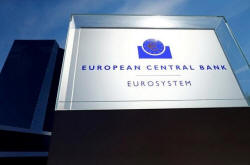|
The
ECB's ultra-easy policy - including bond purchases, free loans
to banks and a charge on deposits - has fueled a recovery in
euro zone lending but banks' margins have started to suffer,
raising concerns about the negative side effects of sub-zero
rates.
Banks stopped easing credit standards for enterprises in the
three months to September and a narrow majority expects to
tighten them in the current quarter, an ECB survey of 141
lenders showed.
The banks, polled last month, cited lower risk tolerance as a
tightening factor when deciding which companies would get a loan
or credit line in the three months to September.
They also voiced their discomfort with the ECB's negative
deposit rate, effectively a charge on banks' excess deposit with
the central bank.
A large majority of banks said the charge had a negative impact
on their lending rates and margins over the past six months.
Some even said it was leading to an increase in their charges to
corporate customers over and above interests.
Companies' demand for credit grew less than banks had expected
in the third quarter of the year, with banks in Spain and Italy
actually reporting a fall.
The ECB's ultra-low interest rates were seen as the main
contributing factor behind the increase in demand in the third
quarter, with mergers and acquisitions activity and debt
refinancing also contributing.
On balance, lenders still expect demand to grow in the last
three months of the year.
(Reporting by Francesco Canepa; Editing by Balazs Koranyi and
Alison Williams)
[© 2016 Thomson Reuters. All rights
reserved.] Copyright 2016 Reuters. All rights reserved. This material may not be published,
broadcast, rewritten or redistributed.
 |
|





